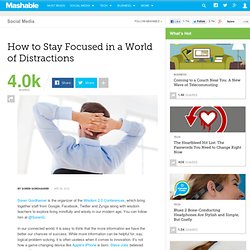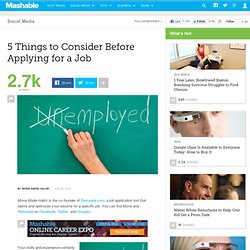

8 Reasons Why Summer Is a Great Time to Job Hunt. Patty Coffey is a Partner in the Information Technology Permanent division at at Winter, Wyman, the largest and one of the most recognized staffing organizations in the Northeast.

Find out more on the Winter, Wyman blog or follow @WinterWyman on Twitter. It’s summertime — those carefree months when you put your sandal-clad feet up and sip a glass of lemonade in front of the ballgame. And it is certainly time to abandon that job search for a few months, right? Wrong. The perception that companies cut back on — or even stop — hiring in the summer is a myth. Conducting a job search during the summer can be tricky though, and it is important to avoid the biggest hazards for job seekers during the summertime: timing and schedules. As a result, patience is key for summer job seeking. Managing Millennials: Why Gen Y Will Be Running the Country by 2020 [INFOGRAPHIC] In just eight short years, 46% of the U.S. workforce will be comprised of millennials.
![Managing Millennials: Why Gen Y Will Be Running the Country by 2020 [INFOGRAPHIC]](http://cdn.pearltrees.com/s/pic/th/millennials-infographic-33170594)
Whether you're frightened or excited by the prospect, the fact remains that young adults born between 1976 and 2001 will be running this country. UNC's Kenan-Flagler Business School and the YEC have teamed up to compile research and create this infographic, which details the who, how and why of managing millennials. SEE ALSO: How Gen Y Women Fare in Today’s Workplace [INFOGRAPHIC] Aside from their preference for engaging work environments, millennials value jobs that encourage social media activity. How Much Money Can You Make Working in Digital? [CHART]
The world has gone digital.
![How Much Money Can You Make Working in Digital? [CHART]](http://cdn.pearltrees.com/s/pic/th/money-working-digital-chart-32275366)
At this point, most companies big and small have a website, Facebook Page and Twitter handle. With these new digital properties comes a slew of digital jobs — with that comes the demand for new staff members to create digital assets, design logos, manage a website and transform sketches on napkins into actual products. In the infographic below, produced by OnwardSearch, you can see how much dough you'd net for various jobs in the digital sector, from interactive design to front-end developers. Do you work in these fields? Do the numbers stack up with what you've seen in the industry? Infographic courtesy of Onward Search. [Infographie] Sites internet, réseaux sociaux, applications mobiles… Panorama du recrutement en ligne. Opensourcing , société de conseil spécialisée dans la chasse de candidats sur Internet, a souhaité en savoir plus sur l’utilisation d’Internet à la fois du coté des recruteurs et du coté des candidats. Smarterer : un outil qui annonce la mort du CV ?
Smarterer permet aux recruteurs de sélectionner des candidats à partir de résultats obtenus en répondant à des tests chronométrés, plutôt qu’en se référant à leurs cvs.

Si l’outil se démocratise, le cv pourrait devenir une antiquité. Le slogan de Smarterer est le suivant : « Plus de CV, des compétences uniquement ». L’idée est de permettre aux personnes à la recherche d’un emploi de prouver de quoi elles sont réellement capables. How Employers Really Feel About Social Media [INFOGRAPHIC] There's been plenty of talk about how social media has become a successful vehicle for recruiters and job seekers alike, but what about employers?
![How Employers Really Feel About Social Media [INFOGRAPHIC]](http://cdn.pearltrees.com/s/pic/th/employers-really-infographic-31702351)
According to this infographic, researched and developed by PayScale, the higher-ups are really not too keen on the social media movement at large, especially when it involves giving social media freedom to employees within the company. And the fear of negative information keeps employers running for a tight leash. Only half of companies have a formal social media policy, and 42% of companies surveyed nix all forms of social media activity at work. In the employers' eyes, social media should be exclusively reserved for carefully managed brand promotion and professionally handled social recruiting. Workstateofmind_041312.jpg (Image JPEG, 972x2860 pixels) - Redimensionnée (27.
Les 4 challenges des entreprises dans un monde digital - MediasSociaux.fr MediasSociaux.fr. Internet fait bouger les frontières et oblige les entreprises à penser à leur digitalisation.

How to Stay Focused in a World of Distractions. Soren Gordhamer is the organizer of the Wisdom 2.0 Conferences, which bring together staff from Google, Facebook, Twitter and Zynga along with wisdom teachers to explore living mindfully and wisely in our modern age.

You can follow him at @SorenG. In our connected world, it is easy to think that the more information we have the better our chances of success. While more information can be helpful for, say, logical problem-solving, it is often useless when it comes to innovation. It’s not how a game-changing device like Apple's iPhone is born. Steve Jobs believed as much. 5 Things to Consider Before Applying for a Job. Mona Abdel-Halim is the co-founder of Resunate.com, a job application tool that tailors and optimizes your resume for a specific job.

You can find Mona and Resunate on Facebook, Twitter, and Google+. Your skills and experience certainly lend themselves to certain types of jobs, but they aren’t the only things you should consider when applying for a new position.